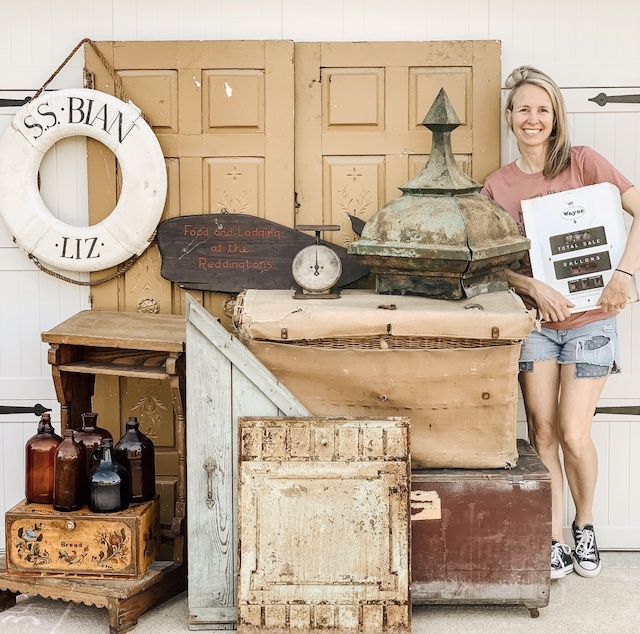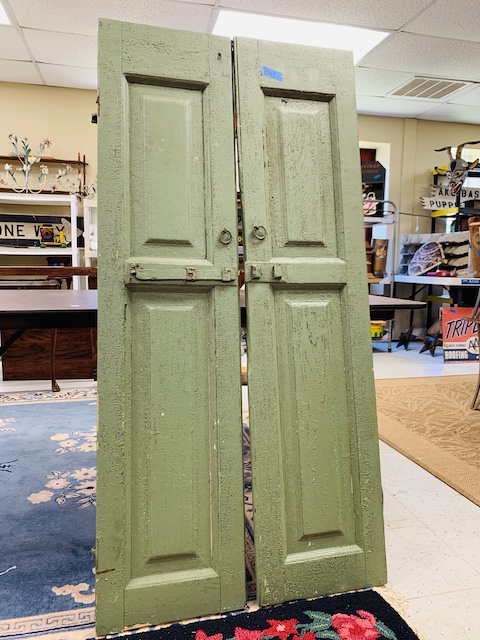Have you ever wanted to know how an auction works? I am sharing my tips for success at a live auction right here!

As an antique dealer, I have been attending live auctions for several years! A live auction is a ‘bidding event’ that is hosted by a licensed auctioneer and that is hosted in real time. Live auctions occur when a group of people gather together and bid against each other for a specific item. The auctioneer facilitates the bidding and the bidders bid in live increments (determined by the auctioneer), with the highest bidder taking home the prize. Live auctions can be a fun (and exciting) way to get some really cool things!
However, auctions can be a bit intimidating, especially if you have never been to one before! Today I am sharing some of my best tips for success at a live auction. My hope is that these tips and tricks and nuggets of information will give you the tools – and confidence – to get out there and go to your local auctions!

How To Find An Auction
There is a handy website called AuctionZip.com and there you can search for auctions by state and even by category. On the website you will see a field that you can fill in with your zip code and the number of miles you are willing to travel. This website is very easy to use and is also a great way to find an auction local to you!
Preview Time Verses Start Time
When you see a listing for an auction you may see a ‘start time’ listed. Most auctions allow you to enter the bidding area early so that you can preview the items up close. With that in mind, the start time is usually that period when you can enter the bidding area. The actual bidding is usually an hour or so after the preview time. So, be prepared to have to wait a bit for the auction to actually begin if you plan to attend the preview.
What To Do Before You Go To The Auction
Preview The Pictures Online
While you can preview items in person at an auction, it is always a good idea to check out photos of the auction items online before you go. This way you can know for sure WHAT items are going on the block that day. You don’t want to waste time attending one if there are not things that you want to bid on. From farm animals to regular household items, there are many auction ‘categories.’ Make sure you want what is being sold.
Set A Spending Limit
It can be really easy to get carried away at an auction! There is usually a little competition involved when trying to win an item, so determine how much the item is truly worth to you and set a reasonable spending limit for yourself. Knowing your limit ensures you don’t get caught up in the moment. This will help you to avoid any ‘buyers remorse’ later on!
Be Aware Of The Additional Percentages & The Payment Terms
It is important to remember that when you are bidding on an item at an auction that you will have to pay a percentage MORE than your winning bid. There will always be Buyers Premium (usually 10%) which is an auctioneer’s fee added to the buyer’s winning bid. You will also need to account for additional sales tax and sometimes even a credit card fee. The additional fees added on can really make a big difference to the final cost of an item so be aware of that as you are bidding. You may also want to confirm that the auction house takes all forms of payment! You will need to pay for the item before you walk out.
What To Bring To An Auction
- You will need to make sure you have your ID which will be used to secure your bidder number when you arrive.
- Bring a paper and pen to keep track of what you bid on and and the amount of your winner bid. With things moving so quickly, it can be easy to lose track sometimes.
- Auctions can drag on sometimes. There are usually snacks for sale at the auctions that I have been to, but I always pack a snack just in case!
- Bring you Tax ID number if you are buying to resell to avoid paying taxes – if you have one!
What To Do When You Arrive
The first thing I always do is get my bidder number. There is usually a table or counter set up when you walk into an auction and I just look for the line!
Once I have my bidder number I like to find a good seat. I usually like to sit on an aisle in the middle of the crowd. This allows me to see the items ‘on the block’ but also lets me see some of the bidders as well. I just claim my seat with a coat or a ball cap and then I like to stroll around and preview all of the goodies.
I will always scan the room for items I am interested in bidding on and I will check those items for any damage. Remember, all items are sold “as is” so it is the bidders responsibility to make sure that the item is what they want. Also, I like to go through and examine any box lots that are there. Sometimes you can find a real treasure (that other bidders may miss) in a box lot if you dig willing to dig a little.
I also jot down all the lot numbers that I may be interested in bidding on. Each item going up for auction is assigned a lot number (which helps to identify the item) and I make sure I keep track of the ones I am interested in.
What To Expect Once The Auction Begins
You need to be prepared for how the auctioneer does his job. An auction is usually very quick paced and things move at lighting speed sometimes. If you have never heard an auctioneer do his job, then you MUST KNOW that he/she will be speaking in what some people call an “auctioneer chant.” It is a rhythmic repetition of numbers and “filler words” spoken by auctioneers when taking bids – and it is super cool. (By the way, did you know there is an auctioneer school? Here is a little snippet of some of the tricks of the trade – I promise, you will want to see this!)
Like every other business, the auction business has its own ‘language.’ Here are a few auction terms that I found around the web that you may want to become familiar with. Becoming familiar with these terms may be my most important auction tip! And, make sure you are listening to the auctioneer very carefully. If you do not understand, stop them and have any questions resolved then and there. Please, do not wait and bring your misunderstanding to the cashier. At this point, it is too late.
Absentee Bidder:
A person who may not attend the sale but submits, in advance, a written or oral bid that is the top price he/she will pay for a given property.
Absentee Bid/Proxy Bid:
A bid on an item that a bidder leaves without being physically present. LiveAuctioneers allows a bidder to leave a bid on any item listed online by clicking “Bid Now” and entering a bid amount. All bids are kept confidential from the auctioneer and other bidders. At the time of the live auction, the bidding system will attempt to execute your bid at the lowest cost possible.
“As Is:”
Also known as “as is, where is” and “in its present condition.” Typically, this is a sign that no return privileges will be granted.
Competing bid:
During a sale, the auctioneer may be accepting competing bids for an item from various sources; these include (but are not limited to):
- bids from an in-house audience
- telephone bids
- book bids
- absentee bids
- other bidding platforms
One Money
If the auctioneer says Lot #72 (let’s say it is 5 chairs) is going for ‘one money’ and you bid $30, you would be purchasing the whole lot (all of the chairs) for only $30 (plus buyers premium and sales tax, as applicable).
Reserve or Reserve Price:
The minimum price that a seller is willing to accept for an item to be sold at auction. This amount is never formally disclosed.
Starting Price:
The likely starting bid for a given auction, set by the seller at the time of listing.
Two Times The Money:
When similar or compatible items are being sold this way, the price for one item is multiplied by the number of items sold. For example, if you are bidding on a set of two chairs and the auctioneer says the high bidder will have to pay “two times the money,” and you win the bid at $125, you will then have tp pay $250 for the two chairs.
Choice
A method of auction where the successful bidder has the right to pick the item or items he/she wishes to purchase at the bid price per piece. Generally the merchandise is grouped in similar or like items. Often, the merchandise left will be offered to the general bidders at the same price, on a first come, first serve basis. Any merchandise left may be re-auctioned later in the auction
How To Bid
This is the simple -and fun- part! When bidding, your main objective is to make sure that the auctioneer sees you. I simply raise my number high to bid, but others will yell “here,” or nod, or raise a finger. Most any gesture to the auctioneer will work to let him/her know you want the item! My biggest tip here is don’t be shy about bidding and make sure the auctioneer sees you. Also, once the auctioneer says “sold”, the item is gone even if you are willing to continue bidding. There are no do-overs in the auction business.
Keep Track Of Your Things
As soon as the auctioneer says “sold,” the item becomes the property of someone new. If you are the high bidder then you own it. Unfortunately, sometimes an auction item may get misplaced or even stolen during the auction.
However, you are still responsible for paying for it. Make sure you keep track of the items you win.
How To Cash Out
Once you have won an item, and when you are ready to get on home, all you have to do is simply go to the cashier and tell them you are ready to cash out! This isn’t always a quick process so in order to avoid a long line at the very end I sometimes cash out early, especially if there isn’t anything else at the auction that I want to purchase. And, the great thing is, you can still bid on something after you have cashed out – using your same number. You will just have to stay in the line again!

Wrap Up
Auctions are so much FUN! And, they are a great place to find some amazing pieces. If you have been hesitant about attending one then I hope these tips for success at a live auction will help you feel more confident! And now, a quick question! If you have been before, what was your favorite score? Mine has to be an antique traveling truck. I can not wait to hear yours! Cheers to all the auctions in our future!
If you enjoyed my tips for success at a live auction then you may want to check out some of my estate sale tips here!
 Dried Hydrangeas In the Cupboard
Dried Hydrangeas In the Cupboard Vintage Container Garden
Vintage Container Garden Vintage Planter Collection: A Turquoise Vignette
Vintage Planter Collection: A Turquoise Vignette DATING OLD COCA-COLA BOTTLES
DATING OLD COCA-COLA BOTTLES


Hi Emily! This is a very good article! I went to ONE auction a few years back … never again. My husband bid on the 3 wire egg baskets the guy was holding and thought we got a great deal at $25! Found out when we went to pay for them that they were $25 EACH! Never heard that mentioned at all … never said “choice”, never said “each”. As fast as the auctioneers were moving, it gotvto be very stressful to me. I’m sticking to estate and yard sales!!
Oh NOOOO – I am so sorry to hear that this happened to you! Uggg – so frustrating! Thank you so much for taking time to read the post … but yes, stay in an area that makes you feel comfortable for sure!
Hi Emily — fantastic post! I love going to auctions but always felt intimidated about bidding since I don’t understand how it all works. Your article is incredibly helpful! Now I can attend auctions with more confidence and have some fun. Thank you!
Oh my word – I am so so so happy to read this! I hope you go to one soon and please report back to me and let me know ho wit goes!